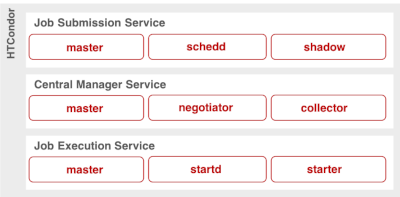Table of Contents
Overview
HTCondor is a workload management framework that supervises task executions on local and remote resources. HTCondor is composed of six main service daemons (startd, starter, schedd, shadow, negotiator, and collector). In addition, each host on which one or more of these daemons is spawned must also run a master daemon, which controls the execution of all other daemons (including initialization and completion).
Creating an HTCondor Service
HTCondor is composed of a pool of resources in which jobs are submitted to perform their computation. In WRENCH, an HTCondor service represents a compute service (wrench::ComputeService), which is defined by the wrench::HTCondorService class. An instantiation of an HTCondor service requires the following parameters:
- A hostname on which to start the service;
- The HTCondor pool name;
- A
std::setofwrench::ComputeServiceavailable to the HTCondor pool; and - A
std::mapof properties (wrench::HTCondorServiceProperty) and message payloads (wrench::HTCondorServiceMessagePayload).
The set of compute services may represent any computing instance natively provided by WRENCH (e.g., bare-metal servers, cloud platforms, batch-scheduled clusters, etc.) or additional services derived from the wrench::ComputeService base class. The example below shows how to create an instance of an HTCondor service with a pool of resources containing a Bare-metal server:
Anatomy of the HTCondor Service
In WRENCH, we implement the 3 fundamental HTCondor services, implemented as particular sets of daemons. The Job Execution Service consists of a startd daemon, which adds the host on which it is running to the HTCondor pool, and of a starter daemon, which manages task executions on this host. The Central Manager Service consists of a collector daemon, which collects information about all other daemons, and of a negotiator daemon, which performs task/resource matchmaking. The Job Submission Service consists of a schedd daemon, which maintains a queue of tasks, and of several instances of a shadow daemon, each of which corresponds to a task submitted to the Condor pool for execution.

WRENCH HTCondor service implementation spawns two additional services during execution: wrench::HTCondorCentralManagerService and wrench::HTCondorNegotiatorService.
The wrench::HTCondorCentralManagerService coordinates the execution of jobs submitted to the HTCondor pool. Jobs submitted to the wrench::HTCondorService are then queued in a std::vector<wrench::StandardJob *>, which are then consumed as resources become available. The Central Manager also spawns the execution of the wrench::HTCondorNegotiatorService, which performs matchmaking between jobs and compute resources available in the pool. Note that job submission in HTCondor is asynchronous, thus our simulated services operates independent from each other (see the Interacting with services section).
 1.8.13
1.8.13